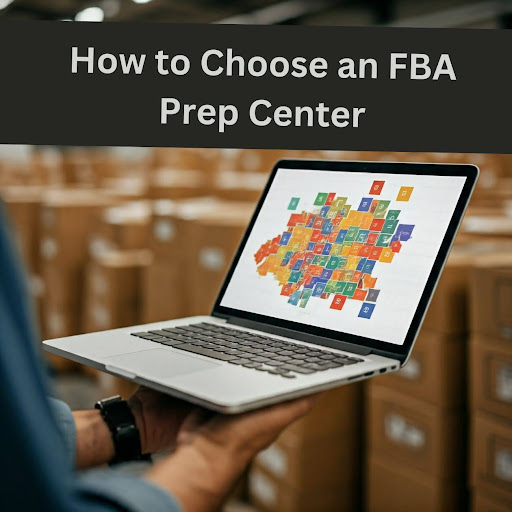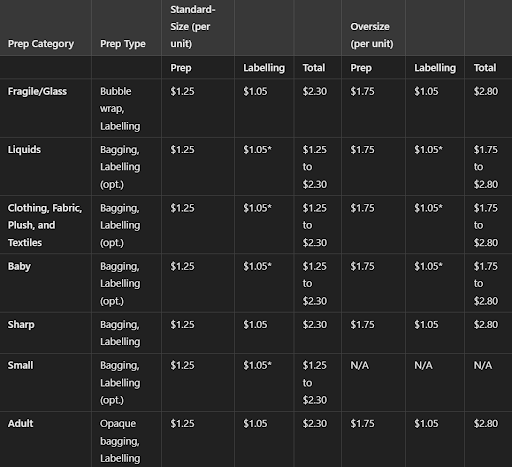How to Choose an FBA Prep Center: Top Key Aspects

Introduction
Choosing the right FBA prep center is a crucial decision for Amazon sellers using Fulfillment by Amazon (FBA), especially those dealing with large volumes or operating from outside the U.S. A reliable prep center can handle tasks such as product inspections, labeling, packaging, and shipping to Amazon’s fulfillment centers, freeing up your time to focus on scaling your business. However, selecting the wrong prep center can lead to logistical issues, increased costs, and customer dissatisfaction. In this guide, we’ll cover 10 key aspects to consider when choosing an FBA prep center to ensure your inventory is processed efficiently, meets Amazon’s requirements, and maximizes profitability.
1. Location of the FBA Prep Center
The location significantly affects shipping costs, turnaround times, and tax implications.
-
Proximity to Fulfillment Centers: Choose a prep center close to major Amazon hubs to reduce inbound shipping costs and delivery times.
-
Tax-Free States: For cost savings, select a prep center in a tax-free state like Oregon, New Hampshire, or Delaware. This can eliminate sales tax expenses on inventory, offering substantial savings for sellers who would otherwise pay sales tax in high-tax states.
-
International Considerations: If selling internationally, opt for a prep center with experience in handling cross-border shipments and customs requirements.
2. Range of Services Offered

Different prep centers offer various services, so choose one that matches your needs.
-
Basic Services: Ensure the prep center can handle essential tasks like inspection, labeling, poly bagging, bundling, and shipping.
-
Additional Services: Some prep centers offer inventory storage, returns handling, and custom packaging. These services can be useful if you need more comprehensive support.
-
Special Handling Requirements: If you sell items requiring special care (e.g., fragile items, liquids, temperature-sensitive products), ensure the center is equipped to handle them. Prep centers with experience in Amazon's FBA Prep Service can also help with packaging products according to Amazon’s specific requirements.
3. Turnaround Time
Fast turnaround times are crucial for keeping inventory moving and avoiding stockouts.
-
Standard Processing: Look for prep centers with a 2-5 business day standard turnaround time.
-
Expedited Services: Some centers offer faster processing for an additional fee, which can be especially helpful during peak seasons like Q4.
-
Seasonal Capacity: Verify if the prep center can handle increased volume during busy periods without compromising on turnaround times. This is important for minimizing delays that can occur with Amazon's own prep services, which may take 48 hours or more for unplanned prep.
4. Fees and Pricing Structure

Understanding the fee structure is vital for budget management.
-
Per-Unit Fees: Compare the per-unit costs for basic services like labeling and packaging. Be aware of any minimum fees for specific prep categories, such as fragile or sharp items.
-
Storage Fees: Some centers may charge monthly storage fees if you keep inventory at the prep center. Check if free storage is available for a limited time.
-
Additional Fees: Extra charges may apply for special handling, returns, or expedited services. If considering Amazon’s FBA Prep Service, review fees based on the type of prep (e.g., bagging, bubble wrapping) and size of the product (standard or oversize).
-
Flat-Rate Pricing: Prefer prep centers with flat-rate pricing to avoid unpredictable costs due to hidden fees like inspection or poly bagging charges.
5. Experience and Expertise with Amazon FBA
Selecting a prep center with expertise in Amazon FBA can help avoid issues.
-
Compliance Knowledge: The prep center should be familiar with Amazon’s packaging and labeling guidelines to prevent potential fines or inventory rejections.
-
Handling Special Prep Categories: For products under specific prep categories like Fragile/Glass, Liquids, or Sharp, ensure the center understands Amazon’s requirements and has experience in these areas.
6. Transparency and Reporting

Transparent processes and regular updates help keep your inventory organized.
-
Real-Time Tracking: The prep center should provide inventory tracking, so you always know the status of your shipments.
-
Reporting: Weekly or monthly reports detailing processed units, shipments, and any discrepancies can help you stay on top of your inventory.
-
Responsive Communication: Choose a prep center with a support team that responds quickly to questions or issues.
7. Technology Integration
Integration with your e-commerce systems can streamline inventory management.
-
Software Compatibility: Ensure the prep center supports integrations with platforms like Amazon Seller Central, Shopify, WooCommerce, or InventoryLab.
-
Automated Notifications: Look for automated notifications about inventory status, completed shipments, and processing milestones.
-
Cloud-Based Systems: A cloud-based system provides real-time updates and easy access to your inventory data, making it easier to manage your business.
8. Reviews and Reputation
The reputation of a prep center gives insight into service quality.
-
Online Reviews: Check reviews on platforms like Google, Trustpilot, and Amazon seller forums.
-
Testimonials and Case Studies: Look for customer success stories and testimonials to understand the center’s strengths.
-
Seller Community Feedback: Engage with other Amazon sellers in online groups to get recommendations and hear about their experiences with different prep centers.
9. Flexibility and Scalability
Ensure the prep center can grow with your business.
-
Flexible Contracts: Look for prep centers that offer flexible agreements, allowing you to adjust services as needed.
-
Volume Handling Capability: Confirm the center can handle large volumes during peak sales periods, such as Prime Day or Black Friday.
-
Custom Solutions: Some centers offer custom packaging, kitting, or labeling services tailored to your needs.
10. Customer Support and Communication
Reliable customer support ensures issues are quickly resolved.
-
Dedicated Account Managers: Some centers provide a dedicated account manager for personalized assistance.
-
Availability: Make sure the support team is available during your business hours and offers multiple contact methods (phone, email, live chat).
-
Proactive Issue Resolution: Choose a center that addresses problems quickly to minimize disruptions.
Conclusion
Choosing the right FBA prep center is a crucial step in optimizing your Amazon business. By considering factors like location, range of services, pricing, and customer support, you can make an informed decision that aligns with your business goals. A well-chosen prep center helps you stay compliant with Amazon’s requirements and streamline operations, enabling you to focus on growth.
If you need personalized guidance or help fine-tuning your strategies, Superfuel AI can assist. Our AI-powered assistant analyzes 36+ key Amazon metrics to identify and address the root causes of sales fluctuations, helping you optimize your storefront and boost sales. Reach out to us at support@superfuel.io.
--
Ben Mathew, Amazon Expert
Ben Mathew is a co-founder at Superfuel, a sales assistant for Amazon sellers. In the past, Ben and his team of e-commerce specialists and software engineers have launched 40+ new brands on Amazon, taking them from zero to bestsellers. In his free time, he is either learning from other top sellers or encouraging his 3 daughters in their love for reading. He is reachable at ben [at] superfuel.io.
FAQs
-
What services do FBA prep centers typically offer?
FBA prep centers usually handle inspection, labeling, poly bagging, bundling, and shipping. Some also provide storage, returns management, and custom packaging. -
How much does it cost to use an FBA prep center?
Costs vary based on services, volume, and location. Expect per-unit fees, storage charges, and additional fees for special handling or expedited services. -
Can I use an FBA prep center if I'm selling internationally?
Yes, many centers are equipped to handle international shipments, customs, and cross-border requirements. -
How can I ensure my prep center follows Amazon’s guidelines?
Choose a center experienced in Amazon FBA that stays updated with Amazon’s policies for packaging, labeling, and inventory management. -
What should I do if my FBA prep center has long turnaround times?
Discuss concerns with the prep center and inquire about expedited services. If the problem persists, consider switching to a faster prep center.